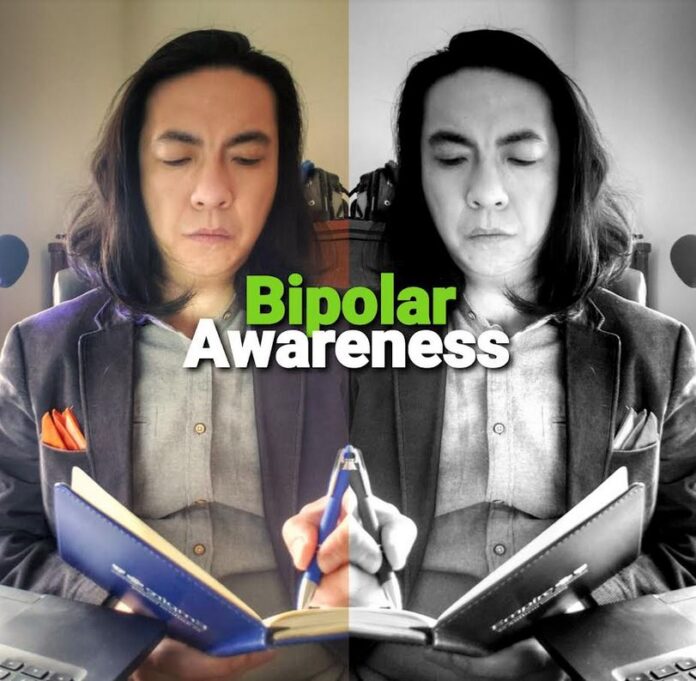By Peter Zhao
It is easy to buy into your own lies. I know this because I have been lying to myself for a long time. Until now.
About a year ago I published an OpEd titled 1st person: My lifelong battle with Attention Deficit and Hyperactivity Disorder. In that column, I talked about my 30 years of living my life in America as a Chinese Immigrant diagnosed with Tourette Syndrome, ADHD (attention deficit hyperactivity disorder), and OCD (obsessive-compulsive disorder). I talked about my struggles, my medicine experience, and the struggles I have as an adult living on these spectrums. In closing I talked about how I’ve planned to have my ADHD reevaluated as an Adult 30 years later.
A month after my Christmas Eve mental breakdown that nearly killed the holiday for the family, I was diagnosed Bipolar 1 with Major depressive episodes.
I now have a team of two therapists supporting me and both of them are Asian American mental health experts who are keen to teach skill sets that promote mindfulness. The therapist who is in charge of my medicine management comforted me and told me never to value my success solely based on material things and job performance but I should feel prouder for my accomplishments in managing my mental health conditions while juggling life. My doctor said it
is astonishing to learn how someone like me, Bipolar 1 with major depression, is able to stay highly functional and survive all these years.
When I was 12 years old I started to take medicine to suppress the tics associated with Tourette’s syndrome. At the time, my tics included motor tics such as jaw movements, head shakes, fast eye blinks, neck jerks, shoulder raise, and I also had vocal tics, I repeated Gan 干 which is the Taiwanese way of saying f*ck. Later I learned the hard-to-control repetition of profane language is a trait of Tourette’s called Coprolalia. My mother wanted me to take medicine because the medication is able to stop these embarrassing tics. At the time I was bullied daily in school and everyone in school made fun of me.
LATEST STORIES
Shortly after I started the medicine, Orap or its generic name Pimozide, an older first-generation antipsychotic medicine originally produced for schizophrenia patients but later converted to be used to treat disorders like Tourette. Because a Tourette diagnosis requires a secondary diagnosis of comorbidities or other conditions occurring on the Tourette Spectrum, this medicine also suppresses my ADHD and OCD symptoms.
I remember in 1992 when I took this med I started at 2.5 MG daily dosage regimen without periodic lab and medicine management. I was given a “lifetime” prescription of this “miracle” drug and I was all set. Initially, the only side effect was feeling sleepy but a few months later, the side effects took a cynical dark turn. I was hallucinating and I heard voices. Not only that, more vocal tics occurred like barking noise while the med took away most of the severe motor tics.
My coprolalia increased. So did my tendency to suddenly blurt out “f*ck you.” The worst of all side effects from this medicine was the uncontrollable mood swing. My experience with Manic Depression aka Bipolar started around 7th grade.
Every day I observed my mood rise up to the height of hyperactivity and euphoria then crash down to a low self-esteem, low self-confidence, and hopeless state of mind. At age 12 I really didn’t know what this feeling was but all I know is whenever I’m feeling down I won’t be able to play and be myself without feeling overly self-conscious and self-critical. Eventually, the self-critical part of me went from critical thoughts to hallucinating voices. I actually heard my own conscience criticize in the tone of my mother.
The voices blame me for my failure to participate in team sports, the voices taunted me and called me a loser and called me stupid. At the time my mother was really joyful when she was presented with the initial result of the medicine. In her mind, the physical manifestation of the tics was an embarrassment for her. She felt my condition lost face for her and my condition may become the gossip of the town and eventually affect her own career path.
I knew how competitive my mother was. I knew she is the type who believes in the stigma of mental health that these conditions can all be conquered if you have strong willpower. She won’t hesitate to call someone weak-minded and I knew I couldn’t tell her about my voice because I assumed she would think her son shouldn’t be weak-minded.
I kept my mood swing and the voices a secret and I endured my own mental torment until I reached puberty. By 14 or 15 I conveyed to her to stop the meds because of the mental health side effect. As expected she did not like my suggestion and she even thought I was being a teenager who made up a story just to pick a fight with her.
Unfortunately, none of the pediatric neurologists and psychiatrists fully understood what Tourette and comorbidities were and they couldn’t understand why the antipsychotic was making me hallucinate. Instead of suggesting I stop the med they asked me to try wax and wane the dosage meaning to gradually cut down. They also recommended I switch medicine to Haldol which was another notorious generation 1 antipsychotic that also produced very bad side effects.
Mom was very concerned about the reemergence of the more visible physical tics so I kept on taking the med through my teenage years. By 20 I had already gone through years of fighting with mom on an almost daily basis which prompted me to move out of her house. With the support of my ex-girlfriend at the time, I stopped medication on my own. About 1 week after usage those nasty voices no longer manifested.
Today, 21 years after I stopped the medicine I still manage a set of motor and vocal tics but the severity and frequency are far less than in my younger years. Today, like every other day I suffered a day of anxieties. Even as I type this now I can feel the anxieties tingling in my arms and in my hands. As an adult with Tourette’s syndrome, Tics are the least concerning but the mental health comorbidities of Tourette are the most daunting especially those involving mood and anxiety. By now I have already received my diagnosis for Bipolar 1 with Major depressive episodes. But how I got here wasn’t easy at all.

For a very long time, I’ve considered my anxieties and my moods as my least concerns, and just like my mother the physical manifestation of my Tourette outweigh the mental health co-occurring conditions like anxiety and mood swings. What I didn’t realize was whenever I was feeling good, those were the days when I was manic. I felt I was smarter or I had more potential than others. The very comfort zone I created for myself came from the narcissistic traits of a manic episode. The feeling of untouchableness exists only when my mood is at its peak because once my mood drops I dip into depression territory and I would become anything but positive. In my depressive state, I will feel guilty and find myself acting toward guilt and driven by guilt. I would feel hopeless and worthless. In the worst state of mind, I had Suicidal Ideation.
I’ve been advocating Tourette’s syndrome and ADHD since 8th grade. I tell the world to break the stigma about Tourette and mental health comorbidities but ironically my mind was already trained to see Mental Health as the stigma I am fighting against. During the past 2 years working from home in the pandemic, I found my work performance suffered tremendously due to my lack of focus and ability to concentrate. I blamed all these on ADHD which prompted me to publish my last OpEd on this very paper.
Last Christmas eve I nearly ruined the holiday for everyone. I felt numb and frozen at work during Christmas eve afternoon. I think a lot of people were not in the mood to work but for me it was different because I can no longer contain the lies which I have told myself way too many times. It’s not just ADHD that’s diminishing my focus and concentration, it’s not just Tourette that’s making me anxious and agitated, I knew my mood pattern changed. Perhaps I’m getting older and my body can no longer sustain the high octane state of Manicness.
Throughout the pandemic, I was in many depressive episodes and I thought about death almost on a daily basis. I was less confident, more indecisive, prone to self-blaming, and easily triggered. But what makes it all worse was when I’m depressed and finally reach a point of self-affirmation that I am going to get myself checked up my mood would eventually rise back to manic and I forget my own mental health goals. I will continue to feed myself the lies that I’m too grandeur, I’m too good to have Bipolar, and I can continue to self-medicate by using the same set of failed coping mechanisms.
I started the medication which ironically is another antipsychotic but a generation 3 which has only been on the market for a few years. Before I reached my daily dosage routine I first went to the lab to check my vitals and important numbers because this medication does have side effects and some are metabolic meaning my cholesterol and blood sugar could be affected. The med also helps suppress my Tourette syndrome tics and combined with bi-weekly psychotherapy where I’m learning Cognitive Behavior Therapy, Dialectical Behavior therapy, and mindfulness skill sets help me understand the type of thought distortions that may trigger my depressive or manic episodes.
I never knew how great it can feel to simply feel average. For decades I lived in the ever swinging of my mood going from one extreme pole and onto the other extremity then repeating again, I was either great great great or so bad that I want to die. In a short time, I’ve calmed down so much I was able to analyze my thoughts and understand whenever I’m in a state of the emotional mind, and how to use a rational mind to eventually gain the goal, wise mind.
Whenever I run into people during my advocacy who tell me how sorry they feel about me I will first thank them for their concern but then I will remind them to not see me as a victim but see me as the survivor because too many people out there don’t have the courage like myself to speak out. Too many Asian people are still suffering without knowing. Too many Asian people are afraid to speak out and seek help because they fear the gossip, the bias, and the stigma that mental health conditions like Bipolar, ADHD, OCD, Tourette, and more are just bad habits and if you can’t conquer them then you are weak and your weak mentality will not take your career path to high places. Or worse, people with mental health conditions are often stigmatized by someone so uncontrollable and must be institutionalized.
When I tell people that I have Bipolar 1, they couldn’t believe how high functioning I was but believe me when I say this, if I did not listen to the warning signs of my body and continued without the treatment I could finally meet my doom. I still see people out there, friends and family who may be struggling already with Bipolar but they could be lying to themselves because when we are manic we are confident and fearless but when we are depressed we are sad and lonely.
Having a support team is very very important. If you are a father, a mother, someone’s spouse struggling with a Mood disorder, please try to talk to your significant other because sometimes we create our own false sense of delusion and we assume the opposite of what’s real.
Stop lying to yourself, I hope you find the courage to take action.
AsAmNews has Asian America in its heart. We’re an all-volunteer effort of dedicated staff and interns. Check out our new Instagram account. Go to our Twitter feed and Facebook page for more content. Please consider interning, joining our staff, or submitting a story, or making a contribution.









Excellent story and original perspectives. I share a few of the same issues and found your article helpful. Thank you.
Thank you very much. I hoped my story is relatable to my audience.
Thank you Peter for sharing your story and so much good information about your condition. While I agree with your ending comment about talking to your family member if they seem to be struggling with the condition, but as you say they have delusion and think it’s not true, even when you show them evidence. So sad they seem destined to never make the improvements you are working on for your mental health, so it’s hard not to lose hope.